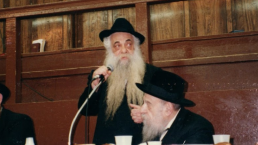Open Invitation To Divine Revelation
BEGIN WITH A GRIN What does a frugal person bring to his guests? A watermelon. Why a watermelon? Because it’s something to eat, something to drink, and a snack too! (Israelis crack open watermelon, sunflower and pumpkin seeds with their teeth as a snack.) • Full Article
BEGIN WITH A GRIN
What does a frugal person bring to his guests?
A watermelon.
Why a watermelon?
Because it’s something to eat, something to drink, and a snack too! (Israelis crack open watermelon, sunflower and
pumpkin seeds with their teeth as a snack.)
PINING FOR REVELATION
This week, we will read parshas Vayeira which begins with Hashem appearing to Avrohom and the visit of three
angels. This Shabbos is also 20 Cheshvan, the birthday of the Rebbe Rashab. The connection between these two
things (the beginning of Vayeira and the Rebbe’s birthday) has to do with a famous Chassidic story related in the
HaYom Yom for 9 Cheshvan.
When the Rebbe Rashab was four or five, he went to his grandfather, the Tzemach Tzedek, on Shabbos parshas
Vayeira, to get a bracha for his birthday. The child began to cry and asked, “Why did Hashem appear to Avrohom
and does not appear to me?” The Tzemach Tzedek answered, when a Jew of 99 decides to circumcise himself, he
deserves to have Hashem appear to him.
The question is what is the lesson for us? What can we learn from Hashem’s appearing to Avrohom and what can we
learn from the young future Rebbe who yearned for such a revelation?
Children are taught that Avrohom deserved this G-dly revelation because of his mesirus nefesh, circumcising himself
at such an old age, not a simple thing. Even the Tzemach Tzedek’s answer highlights the greatness of this deed. But
in a surprising sicha, the Rebbe reveals a new explanation of the verse, an explanation which teaches us how this G-
dly revelation can be something each one of us can have.
From the wording of the verse at the beginning of the parsha, “And G-d appeared to him … and he was sitting in the
entrance to the tent in the heat of the day,” the Rebbe learns that sitting in the entrance to the tent, “to see
whether there was any passerby that he could bring into his home,” as Rashi says, is what caused the G-dly
revelation! Not the mitzva of mila at 99, not endangering his life to do G-d’s command, but the humane act of
hospitality, care and concern for others is what precipitated the G-dly revelation!
According to this, the message for all of us is simple and clear. “The deeds of the fathers are a portent for the
children.” Just like Avrohom merited G-d’s appearance to him by doing the mitzva of having guests, so too, each of
us can merit the same by having guests!
Hospitality (”Eshel) includes food, drink and sleeping accommodations or escorting the guest. Food and drink for a
Jew includes two things, physical food and drink and spiritual food and drink, both of which we need to provide. One
can say that concern for another’s spiritual needs brings the G-dly revelation even more than providing material
needs. After all, with spiritual hospitality, we draw a Jew close to G-d so it’s obvious why the result will be a G-dly
revelation because by bringing a Jew close to Him, He comes close to us and will draw us close to Him, measure for
measure!
There are thousands of Jews out there who are hungry and thirsty. (Amos 8:11) “Not hungry for bread and not
thirsty for water, but to hear the words of G-d,” and we need to provide them with bread and water, Nigleh of Torah
which is compared to bread and water, and Chassidus, the inner dimension of Torah which is compared to milk,
honey, wine and oil.
INVITE HIM IN AND HE WILL COME
Sounds wonderful but the question is, there are thousands of Jew who bring guests under the wings of the Shechina,
thousands of shluchim of the Rebbe who are mekarev Jews of all backgrounds, and we’ve never heard that anyone
would claim that G-d appeared to him like He did to Avrohom. The Rebbe provides three answers to that.
One, it is very possible that those who host and are mekarev Jews are not aware that G-d appears to them in some
way or another, but that does not change the reality that the revelation occurred. The Rebbe brings the analogy of
the Rebbe Rayatz about the wise men traveling in a wagon harnessed to horses who speak deep, wise ideas among
themselves. The horses think about the hay that awaits them. Obviously, the horses’ thoughts about hay have no
effect on the wisdom being spoken. Even if we have the eyes of horses and are not aware of a revelation, it doesn’t
change the reality and truth of a revelation!
Two, a neshama has two parts. The bulk of the neshama is above the body while a very small part of the neshama is
within the body. This essential part of the neshama which is called the mazal of the neshama, sees and hears
spiritual, G-dly things, which we cannot see. But this spiritual vision, “drips” into the neshama within the body and
has an effect on our improving our ways. Even if it seems that we don’t see, the mazal of the neshama sees and that
has an effect.
Three, the complete revelation of the name of G-d will take place in the true and complete Geula as we’ve already
explained many times. The mitzva of hospitality, materially and spiritually, is a mitzva which has a special segula to
hasten the coming of the Geula, thus bringing about a revelation of G-d.
However it may be, if we want to see G-d, if we want to learn a lesson from the Rebbe Rashab, host guests,
materially and spiritually!
TO CONCLUDE WITH A STORY
We will end with a story about hosting which teaches us not only what to give, but how to give, so that the recipient
doesn’t feel like a parasite. One of the big donors to Chabad mosdos in our generation was R’ Shmuel Rohr z’l. At the
Chanukas Beis Chabad in Basel, which he donated, he told a moving story which taught him about giving and mainly
how to give.
During World War II, when he was ten years old, his parents had to escape the city and left him with a friend in
Basel. This man gathered his children around the table and said, “We got a new child in the family today. Shmuel will
be one of our children and since he is the oldest, his place at the table will be next to me.”
Good Shabbos!
42
Join ChabadInfo's News Roundup and alerts for the HOTTEST Chabad news and updates!









































